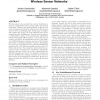Free Online Productivity Tools
i2Speak
i2Symbol
i2OCR
iTex2Img
iWeb2Print
iWeb2Shot
i2Type
iPdf2Split
iPdf2Merge
i2Bopomofo
i2Arabic
i2Style
i2Image
i2PDF
iLatex2Rtf
Sci2ools
118
Voted
CCS
2007
ACM
2007
ACM
The energy cost of cryptographic key establishment in wireless sensor networks
Wireless sensor nodes generally face serious limitations in terms of computational power, energy supply, and network bandwidth. Therefore, the implementation of effective and secure techniques for setting up a shared secret key between sensor nodes is a challenging task. In this paper we analyze and compare the energy cost of two different protocols for authenticated key establishment. The first protocol employs a “light-weight” variant of the Kerberos key distribution scheme with 128-bit AES encryption. The second protocol is based on ECMQV, an authenticated version of the elliptic curve Diffie-Hellman key exchange, and uses a 256-bit prime field GF(p) as underlying algebraic structure. We evaluate the energy cost of both protocols on a Rockwell WINS node equipped with a 133 MHz StrongARM processor and a 100 kbit/s radio module. The evaluation considers both the processor’s energy consumption for calculating cryptographic primitives and the energy cost of radio communicatio...
Related Content
| Added | 07 Jun 2010 |
| Updated | 07 Jun 2010 |
| Type | Conference |
| Year | 2007 |
| Where | CCS |
| Authors | Johann Großschädl, Alexander Szekely, Stefan Tillich |
Comments (0)

